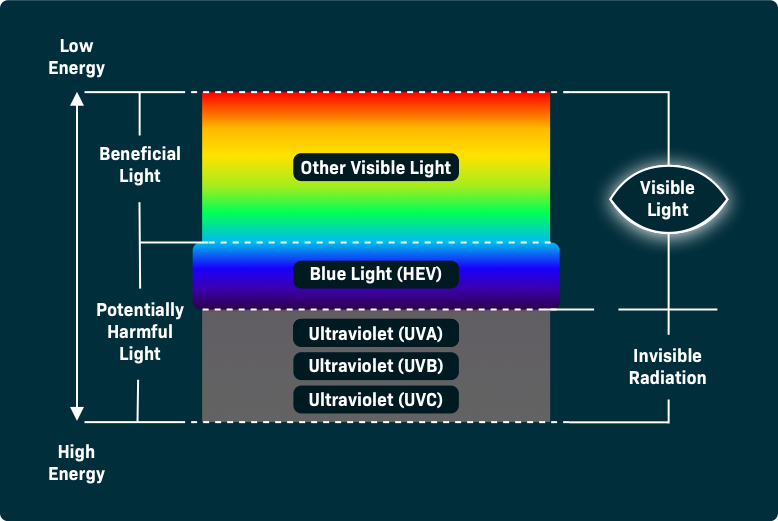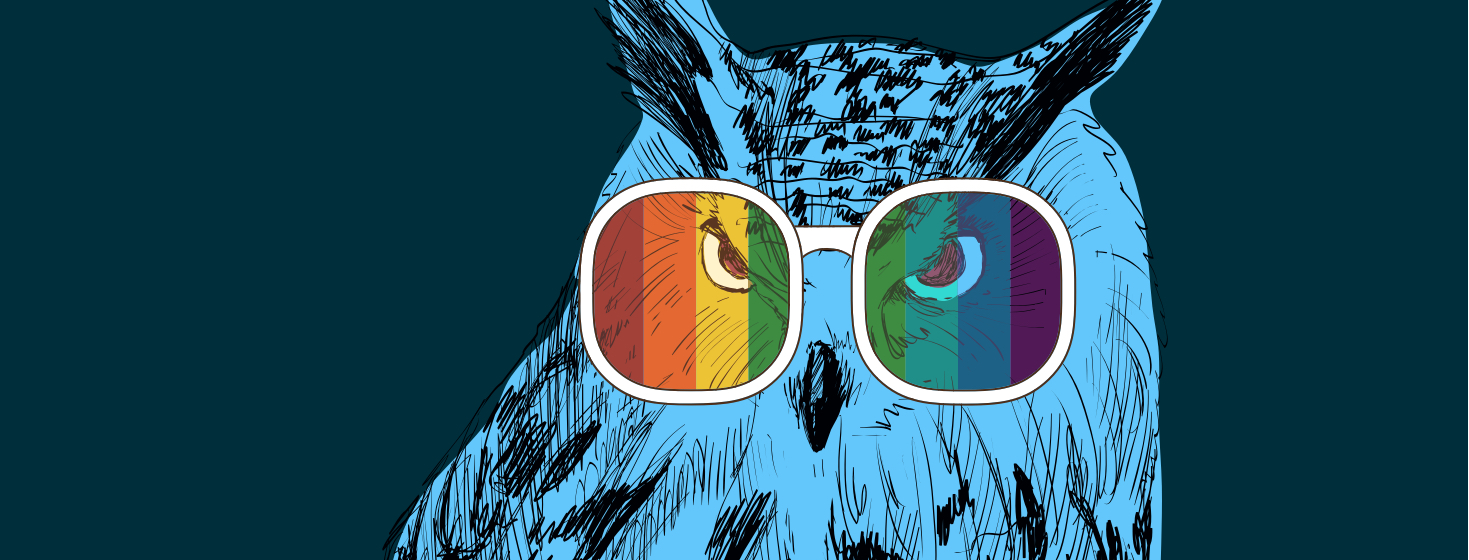Does UV or Blue Light Cause Macular Degeneration?
We know that light is an important part of our health, and can be a danger to us as well. Ultraviolet (UV) light has an important part in our body’s ability to produce Vitamin D, but too much of it can contribute to certain types of skin cancer. Did you know that UV light and blue light can also affect your vision?
What is UV light?
UV light most commonly comes from sunlight, though it does have other sources, such as video display terminals, fluorescent light, and high-intensity mercury vapor lamps (the kind you see at night-time sports stadiums, or city university campuses).1
Types of UV light
UV light is outside of the visible spectrum of light, or white light, and comes in 3 different categories: A, B and C. These categories are divided by their wavelength.
- UVC light is the highest energy, but is fortunately mostly absorbed by the Ozone layer in the earth’s atmosphere.1
- UVB light is next down in energy. This is the light that causes sunburn, and corneal damage.1,2 The effects of UVB light tend to be cumulative, meaning that the more exposure you have over time, the greater the damage is.
- UVA light is the lowest energy of the UV light spectrum, but it causes the most concern to eye care professionals as it is the light that affects the lens of the eye.1
Figure 1. The light spectrum

What is blue light?
Blue light is the highest energy light in the visible light spectrum.3 The main source of blue light is sunlight, but it can also be generated by1,2,3:
- Fluorescent lights, including compact fluorescent lights
- LED lights
- Flat screen TVs
- Computers
- Tablet and smartphone screens
How does blue light affect the body?
Blue light is important for your body. It affects your pupillary reflex (what makes your pupil open and close), and it is very important for your sleep cycle, or circadian rhythm.2,3 Blue light can also be used to treat Seasonal Affective Disorder (SAD), which is a depression that is related to the amount of sunlight that people receive as the seasons change.3 While blue light is important, it may be responsible for retinal damage.
Does UV light cause macular degeneration?
While UV light can lead to the formation of cataracts, it does not seem to have much effect on macular degeneration.2 Anyone who is exposed to UV light can, and should, take precautions against UV light damage to their eyes.
Protecting your eyes from UV light
The best way to protect your eyes from UV light is to wear sunglasses, specifically ones that protect from UVA and UVB light. These will most commonly be marked UV 400, which specifies the wavelength (or energy) that the sunglasses can block.1 Be aware: most inexpensive sunglasses do not provide you enough UV protection.1
Does blue light cause macular degeneration?
There have been recent studies that show a correlation between increased exposure to blue light (especially certain wavelengths) and increased risk for age-related macular degeneration (AMD).2,3 In an increasingly technological society, we are exposed to more blue light than ever before. Highly efficient, less disposable light sources such as compact fluorescent light bulbs and LED lighting also add to the blue light that many people are exposed to. There is concern that this increased exposure may put those who are already pre-disposed to AMD at higher risk for the disease.2 Some studies show that progressive diseases such as Stargardt disease may also be affected by blue light.4
Protecting your eyes from blue light
So what can you do to protect yourself from excessive amounts of blue light?
- First, minimize your exposure to blue light, especially at night.5 This can mean setting screen time limits, both on your TV, phone, laptop, or tablet.
- Second, consider using a filter to limit the amount of blue light your eyes receive.2,3,5 This can be especially helpful if you work at a job where you spend a lot of time in front of a computer. You can buy special filtering screens that attach to your phone, tablet, and laptop. Some of these are made of tempered glass that can further protect your electronics.3
- Another option for filtering is blue light blocking glasses. These are available in non-prescription strength for those wearing contacts or who don’t need corrective lenses. You can also talk to your eye doctor about adding blue light filter to your prescription glasses.
Understanding UV and blue light
While taking precaution is never a bad idea, understand that this research is still in the early stages and recommendations may change as more research is conducted. Talk to your eye care team if you have any questions about blue light and its effect on your eye health, they will be able to help you with any of your specific eye care
needs.

Join the conversation